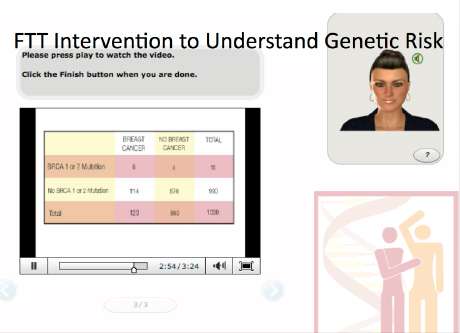Online avatar helps demystify breast cancer risk

(Medical Xpress)—About one in eight American women will be diagnosed with breast cancer during her lifetime – more than 200,000 this year alone. A simple blood test can determine if a woman faces increased risk due to genetic mutations, yet decisions about whether to get the test and what to do about the results are far from simple – a fact exemplified by Angelina Jolie's choice to undergo a double mastectomy last year upon learning she carried a harmful BRCA1 gene mutation.
To help women grappling with these decisions, Cornell psychologist Valerie Reyna and colleagues developed a computer-based system using artificial intelligence to mimic one-on-one human tutoring.
"To our knowledge, this is the first use of an Intelligent Tutoring System (ITS) in patients' medical decision making," said Reyna, professor of human development and director of the Human Neuroscience Institute in Cornell's College of Human Ecology.
The breast cancer Web-tutor, called BRCA Gist (Breast Cancer Genetics Intelligent Semantic Tutoring), is more effective in helping women understand breast cancer risk and their options than traditional educational materials, reports a study published online May 14 in Medical Decision Making ahead of print.
BRCA Gist provides customized instruction on breast cancer and how it spreads, risk factors, genetic mutation testing and the consequences of testing using an animated talking avatar that engages women in "dialogue" about breast cancer and can even answer women's questions.
The Web-tutor draws on well-vetted, publically available information and expert advice from physicians, "but the crucial added ingredient," said Reyna, "is that it effectively conveys the bottom-line or gist of the information." And that's what people rely on to make medical decisions, not detailed facts, she said. The key to the Web-tutor's success, she added, is its basis in fuzzy-trace theory, a model of memory and decision-making that she developed.
To test the Web-tutor's effectiveness, the researchers conducted two randomized-control trials involving more than 400 women. The studies measured knowledge gains and decisions about genetic testing after completing the new Web-based tutorial, viewing the comparable information from the National Cancer Institute (NCI) website or completing an unrelated Web-based curriculum.
The team found that those who participated in the Web-tutor scored higher on knowledge of breast cancer, genetic testing and genetic risk than those using the NCI website, and both groups scored higher than the control group. In making judgments about genetic testing for those with no risk, the Web-tutor helped participants understand that most women do not have known genetic risks and are not good testing candidates, the authors say. Their results support the concept that a gist-based intervention powered by artificial intelligence can be an effective tool to aid patients' medical decision-making, they concluded.
More information: "Efficacy of a Web-Based Intelligent Tutoring System for Communicating Genetic Risk of Breast Cancer: A Fuzzy-Trace Theory Approach." Wolfe CR, et al. Med Decis Making. 2014 May 14. pii: 0272989X14535983. [Epub ahead of print]















